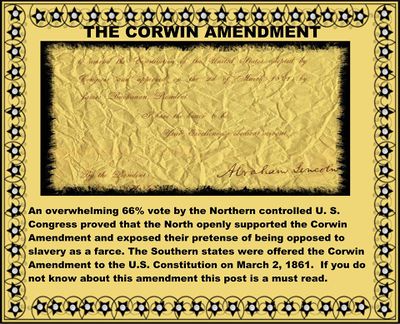Corwin Amendment: Difference between revisions
(Created page with "The [https://en.wikipedia.org/wiki/Corwin_Amendment Corwin Amendment] is a proposed amendment to the United States Constitution passed by the 36th Congress on March 2, 1861 an...") |
No edit summary |
||
| Line 1: | Line 1: | ||
[[File:corwin.jpg|right|400px]] | |||
The [https://en.wikipedia.org/wiki/Corwin_Amendment Corwin Amendment] is a proposed amendment to the United States Constitution passed by the 36th Congress on March 2, 1861 and submitted to the state legislatures for ratification. | The [https://en.wikipedia.org/wiki/Corwin_Amendment Corwin Amendment] is a proposed amendment to the United States Constitution passed by the 36th Congress on March 2, 1861 and submitted to the state legislatures for ratification. | ||
Revision as of 10:19, 14 August 2015

The Corwin Amendment is a proposed amendment to the United States Constitution passed by the 36th Congress on March 2, 1861 and submitted to the state legislatures for ratification.
The "Civil War" was not "about slavery". If it was then why did the Corwin Amendment pass.
The Corwin Amendment would have made slavery permanently legal in America, if the South would not leave the Union.
The following is the text of that amendment: “No amendment shall be made to the Constitution which will authorize or give to Congress the power to abolish or interfere, within any State, with the domestic institutions thereof, including that of persons held to labor or service by the laws of said State.”
In his inaugural address, Lincoln stated: "I understand a proposed amendment to the Constitution has passed Congress, to the effect that the Federal Government shall never interfere with the domestic institutions of the States, including that of persons held to service. Holding such a provision to now be implied constitutional law, I have no objection to its being made express and irrevocable."
However, the Southern States declined to be “Tax Slaves” and treated as an Agricultural Colony of the Industrial North. The South was paying 75-85% of the cost of operating the Federal government via the tariff. Eighty to ninety percent of this tax money was being kept and spent in the North. Lincoln had promised the New England Industrialists that he would raise the tariff higher if elected and he did.